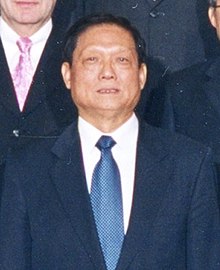Liu Qi (politician, born 1942)
Liu Qi | |
|---|---|
刘淇 | |
 Liu Qi | |
| Communist Party Secretary of Beijing | |
| In office 22 October 2002 – 3 July 2012 | |
| Preceded by | Jia Qinglin |
| Succeeded by | Guo Jinlong |
| President of the Beijing Organizing Committee for the Olympic Games | |
| In office 29 August 2004 – 24 August 2008 | |
| IOC President | Jacques Rogge |
| Preceded by | Gianna Angelopoulos-Daskalaki |
| Succeeded by | Sebastian Coe |
| Chair of the Beijing Organizing Committee for the Olympic Games | |
| In office December 13, 2001 – August 22, 2009 | |
| Preceded by | Committee established |
| Succeeded by | Position dissolved |
| Mayor of Beijing | |
| In office 10 February 1999 – 19 January 2003 | |
| Preceded by | Jia Qinglin |
| Succeeded by | Meng Xuenong |
| Minister of Metallurgical Industry | |
| In office March 1993 – March 1998 | |
| Preceded by | Qi Yuanqing |
| Succeeded by | Position revoked |
| Personal details | |
| Born | 3 November 1942 Wujin, Changzhou, Jiangsu, China |
| Political party | Chinese Communist Party |
| Alma mater | University of Science and Technology Beijing |
Liu Qi (simplified Chinese: 刘淇; traditional Chinese: 劉淇; pinyin: Liú Qí; born November 3, 1942, in Wujin, Changzhou, Jiangsu) is a retired Chinese politician. He formerly served as the Communist Party Secretary of Beijing, and also a member of the Politburo of the Chinese Communist Party. He was also the President of the Beijing 2008 Olympics Organizing Committee.[1]
Biography and career
- Graduated from Beijing 101 Middle School and the metallurgical department of the Beijing Institute of Iron and Steel Engineering, and majored in iron smelting. With a postgraduate education, Liu holds the professional title of senior engineer.
- Mayor of Beijing, 1999-2003. He was succeeded by Meng Xuenong, who was replaced by Wang Qishan after the SARS outbreak.
- Head of the Beijing 2008 Olympic Games Bid Committee (BOBICO).[2]
- Named as one 100 most influential people of 2007 by Time magazine.[3]
- Head of the Beijing Organizing Committee for the Olympic Games for the 2008 Summer Olympic Games.[4]
Subject of human rights litigation
On February 7, 2002, Liu was sued in the United States District Court for the Northern District of California[5] by the San Francisco-based human rights organization, the Center for Justice and Accountability. The plaintiffs in that case alleged that, as mayor of Beijing, Liu was responsible for formulating security policy and had control over the local police. The police were in turn alleged to have tortured the plaintiffs with beatings, electric shock, and forced feedings through tubes inserted through the plaintiffs' noses.[6] The court issued a declaratory judgment that Liu was responsible for violating the defendants' rights to be free from torture and arbitrary detention.[7] However, because Liu did not defend the suit, there were no hearings, trials, or findings of fact on the issues presented.
References
- ^ "Liu Qi: Ensure supply of essentials for Games - the Official Website of the Beijing 2008 Olympic Games". Archived from the original on 2012-10-21. Retrieved 2013-08-14.
- ^ "New Beijing,Great Olympics-our bid". Archived from the original on 2008-03-28. Retrieved 2008-03-25. Beijing 2008 Olympic Games Bid Committee's About Us page
- ^ The TIME 100: Liu Qi, By Simon Elegant
- ^ Anthee Carassava, Protesters disrupt Olympic flame lighting, International Herald Tribune, March 24, 2008.
- ^ Doe v. Liu Qi, 349 F. Supp. 2d 1258 (N.D. Cal. 2004).
- ^ Id. at 1267.
- ^ Id. at 1334.